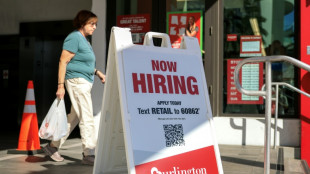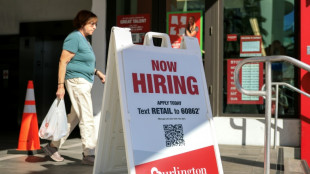
-
 Rob Reiner murder: son not medically cleared for court
Rob Reiner murder: son not medically cleared for court
-
FIFA announces $60 World Cup tickets for 'loyal fans'

-
 Dembele and Bonmati scoop FIFA Best awards
Dembele and Bonmati scoop FIFA Best awards
-
Shiffrin dominates first run in Courchevel slalom

-
 EU weakens 2035 combustion-engine ban to boost car industry
EU weakens 2035 combustion-engine ban to boost car industry
-
Arctic sees unprecedented heat as climate impacts cascade

-
 French lawmakers adopt social security budget, suspend pension reform
French lawmakers adopt social security budget, suspend pension reform
-
Afrikaners mark pilgrimage day, resonating with their US backers

-
 Lawmakers grill Trump officials on US alleged drug boat strikes
Lawmakers grill Trump officials on US alleged drug boat strikes
-
Hamraoui loses case against PSG over lack of support after attack

-
 Trump - a year of ruling by executive order
Trump - a year of ruling by executive order
-
Iran refusing to allow independent medical examination of Nobel winner: family

-
 Brazil megacity Sao Paulo struck by fresh water crisis
Brazil megacity Sao Paulo struck by fresh water crisis
-
Australia's Green becomes most expensive overseas buy in IPL history

-
 VW stops production at German site for first time
VW stops production at German site for first time
-
Man City star Doku sidelined until new year

-
 Rome's new Colosseum station reveals ancient treasures
Rome's new Colosseum station reveals ancient treasures
-
EU eases 2035 combustion-engine ban to boost car industry

-
 'Immense' collection of dinosaur footprints found in Italy
'Immense' collection of dinosaur footprints found in Italy
-
US unemployment rises further, hovering at highest since 2021

-
 Senators grill Trump officials on US alleged drug boat strikes
Senators grill Trump officials on US alleged drug boat strikes
-
Filmmaker Rob Reiner's son to be formally charged with parents' murder

-
 Shift in battle to tackle teens trapped in Marseille drug 'slavery'
Shift in battle to tackle teens trapped in Marseille drug 'slavery'
-
Stocks retreat on US jobs, oil drops on Ukraine hopes

-
 Manchester United 'wanted me to leave', claims Fernandes
Manchester United 'wanted me to leave', claims Fernandes
-
Serbian President blames 'witch hunt' for ditched Kushner hotel plan

-
 Man who hit Liverpool parade jailed for over 21 years
Man who hit Liverpool parade jailed for over 21 years
-
Sahel juntas would have welcomed a coup in Benin: analysts

-
 PSG ordered to pay around 60mn euros to Mbappe in wage dispute
PSG ordered to pay around 60mn euros to Mbappe in wage dispute
-
BBC says will fight Trump's $10 bn defamation lawsuit

-
 Stocks retreat ahead of US jobs, oil drops on Ukraine hopes
Stocks retreat ahead of US jobs, oil drops on Ukraine hopes
-
Suicide bomber kills five soldiers in northeast Nigeria: sources

-
 EU set to drop 2035 combustion-engine ban to boost car industry
EU set to drop 2035 combustion-engine ban to boost car industry
-
Australia's Green sold for record 252 mn rupees in IPL auction

-
 Elusive December sun leaves Stockholm in the dark
Elusive December sun leaves Stockholm in the dark
-
Brendan Rodgers joins Saudi club Al Qadsiah

-
 Thailand says Cambodia must announce ceasefire 'first' to stop fighting
Thailand says Cambodia must announce ceasefire 'first' to stop fighting
-
M23 militia says to pull out of key DR Congo city at US's request

-
 Thousands of glaciers to melt each year by mid-century: study
Thousands of glaciers to melt each year by mid-century: study
-
China to impose anti-dumping duties on EU pork for five years

-
 Nepal starts tiger census to track recovery
Nepal starts tiger census to track recovery
-
Economic losses from natural disasters down by a third in 2025: Swiss Re

-
 Indonesians reeling from flood devastation plea for global help
Indonesians reeling from flood devastation plea for global help
-
Timeline: How the Bondi Beach mass shooting unfolded

-
 On the campaign trail in a tug-of-war Myanmar town
On the campaign trail in a tug-of-war Myanmar town
-
Bondi Beach suspect visited Philippines on Indian passport

-
 Kenyan girls still afflicted by genital mutilation years after ban
Kenyan girls still afflicted by genital mutilation years after ban
-
Djokovic to warm up for Australian Open in Adelaide

-
 Man bailed for fire protest on track at Hong Kong's richest horse race
Man bailed for fire protest on track at Hong Kong's richest horse race
-
Men's ATP tennis to apply extreme heat rule from 2026


Inbred, gibberish or just MAD? Warnings rise about AI models
When academic Jathan Sadowski reached for an analogy last year to describe how AI programs decay, he landed on the term "Habsburg AI".
The Habsburgs were one of Europe's most powerful royal houses, but entire sections of their family line collapsed after centuries of inbreeding.
Recent studies have shown how AI programs underpinning products like ChatGPT go through a similar collapse when they are repeatedly fed their own data.
"I think the term Habsburg AI has aged very well," Sadowski told AFP, saying his coinage had "only become more relevant for how we think about AI systems".
The ultimate concern is that AI-generated content could take over the web, which could in turn render chatbots and image generators useless and throw a trillion-dollar industry into a tailspin.
But other experts argue that the problem is overstated, or can be fixed.
And many companies are enthusiastic about using what they call synthetic data to train AI programs. This artificially generated data is used to augment or replace real-world data. It is cheaper than human-created content but more predictable.
"The open question for researchers and companies building AI systems is: how much synthetic data is too much," said Sadowski, lecturer in emerging technologies at Australia's Monash University.
- 'Mad cow disease' -
Training AI programs, known in the industry as large language models (LLMs), involves scraping vast quantities of text or images from the internet.
This information is broken into trillions of tiny machine-readable chunks, known as tokens.
When asked a question, a program like ChatGPT selects and assembles tokens in a way that its training data tells it is the most likely sequence to fit with the query.
But even the best AI tools generate falsehoods and nonsense, and critics have long expressed concern about what would happen if a model was fed on its own outputs.
In late July, a paper in the journal Nature titled "AI models collapse when trained on recursively generated data" proved a lightning rod for discussion.
The authors described how models quickly discarded rarer elements in their original dataset and, as Nature reported, outputs degenerated into "gibberish".
A week later, researchers from Rice and Stanford universities published a paper titled "Self-consuming generative models go MAD" that reached a similar conclusion.
They tested image-generating AI programs and showed that outputs become more generic and strafed with undesirable elements as they added AI-generated data to the underlying model.
They labelled model collapse "Model Autophagy Disorder" (MAD) and compared it to mad cow disease, a fatal illness caused by feeding the remnants of dead cows to other cows.
- 'Doomsday scenario' -
These researchers worry that AI-generated text, images and video are clearing the web of usable human-made data.
"One doomsday scenario is that if left uncontrolled for many generations, MAD could poison the data quality and diversity of the entire internet," one of the Rice University authors, Richard Baraniuk, said in a statement.
However, industry figures are unfazed.
Anthropic and Hugging Face, two leaders in the field who pride themselves on taking an ethical approach to the technology, both told AFP they used AI-generated data to fine-tune or filter their datasets.
Anton Lozhkov, machine learning engineer at Hugging Face, said the Nature paper gave an interesting theoretical perspective but its disaster scenario was not realistic.
"Training on multiple rounds of synthetic data is simply not done in reality," he said.
However, he said researchers were just as frustrated as everyone else with the state of the internet.
"A large part of the internet is trash," he said, adding that Hugging Face already made huge efforts to clean data -- sometimes jettisoning as much as 90 percent.
He hoped that web users would help clear up the internet by simply not engaging with generated content.
"I strongly believe that humans will see the effects and catch generated data way before models will," he said.
J.Williams--AMWN



